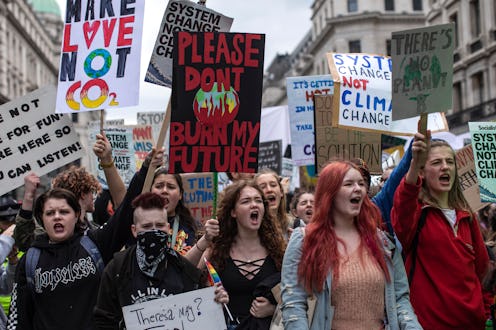Life
How To Organise A Climate Strike In Your Local Area At The Last Minute

If you've been following 16-year-old activist Greta Thunberg's nautical voyage to New York, you'll probably have heard of the upcoming Global Climate Strike. Taking place on Sep. 20 until Sep. 27, the strikes mark the first time that adults are being encouraged to join protesting youth. Thousands of events have already been organised across the globe, but some places in the UK are still lacking action. So if you want to organise a climate strike in your local area, here's how to do it.
"This is about crossing lines — it’s about rebelling wherever one can rebel," Thunberg and 46 other young activists wrote in the Guardian. "It is time for all of us to unleash mass resistance — we have shown that collective action does work. We need to escalate the pressure to make sure that change happens, and we must escalate together."
So far, there are reportedly more than 2,400 events scheduled to take place in the week-long protest. But there can always be more.
Starting an event
Before getting your organising hat on, check that no strike is taking place near you by entering your postcode into the UK Student Climate Network's (UKSCN) events page. Double check via Facebook that one definitely hasn't been set up. If you're a little late to the party, reach out to the organisers and offer a helping hand. But if there's no climate strike in sight, it's time to start one.
The easiest way to organise a local event is via Facebook. With the ability to reach people quickly, it's a quick process that won't leave you scratching your head. UKSCN has even put together a handy guide to help would-be organisers along.
Just make sure you mention YouthStrike4Climate in the title and include the time and location of your protest. (Thunberg advises striking outside your town hall, but you can choose anywhere that's accessible for local residents.) When the page is good to go, register the event with UKSCN and via FridaysForFuture.
Spreading the word
This is where Facebook comes in handy once again. Send your event page to all of your Facebook friends, including the ones from school you haven't spoken to in years. Reach out to your family and actual friends too. Send them a personalised message or use one of UKSCN's templates to speed up the process.
Don't forget to use physical means to raise awareness. Flyers, leaflets, and posters are all good methods as is good, old-fashioned door-knocking. Seeing as the climate strikes have been deemed "acceptable" by some authorities, local businesses, media, or politicians may even be willing to help.
Legally, you have to inform the police if your strike will involve a march. And you have to do it six days before the event. But if no march is planned, there doesn't have to be any police involvement.
Involving the youth
Getting caught up in being the town figurehead for activism can be easy, but try not to dismiss the people who started the movement. Get local youth campaigners involved by asking them to speak at your event, by inviting them onto your organising team, or by enlisting their help to create signs.
Make sure your strike is safe for all ages to participate and ensure people know what their role is on the day, whether that's handing out sweets and refreshments to keep people's spirits up or communicating with law enforcement if police make an appearance.
Involving your workplace
Sometimes, it's impossible to embark on an all-day strike. Certain jobs have to be fulfilled and certain employers are less than happy to grant a day off to save the planet. But there are still ways for the office to band together.
Research how your industry is affecting, and could be affected by, the climate crisis and propose a plan of action to your boss. This could be organising a mini strike at lunchtime or scheduling a training day to encourage eco-friendly working. Ask experts or youth activists to speak at your workplace and foster a culture of positive change.
It doesn't matter what you decide to do in September. Doing something is what counts. Climate strikers sum it up best of all: "Our house is on fire — let’s act like it."